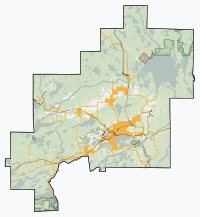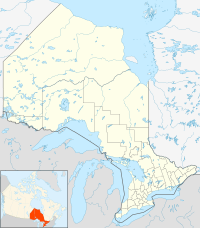Wahnapitae First Nation facts for kids
Quick facts for kids
Wahnapitae 11
|
|
|---|---|
| Wahnapitae Indian Reserve No. 11 | |
| Country | |
| Province | |
| District | Greater Sudbury |
| First Nation | Wahnapitae |
| Area | |
| • Land | 10.63 km2 (4.10 sq mi) |
| Population | |
| • Total | 102 |
| • Density | 9.6/km2 (25/sq mi) |
| Website | www.wahnapitae firstnation.com |
The Wahnapitae First Nation (which means Ojibwe: Wahnapitaeping in the Ojibway language) is a group of Ojibway Indigenous people in Ontario, Canada. They are a First Nation with their own band government. Most members live on the Wahnapitae Indian Reserve No. 11. This reserve is about 1,036 hectares (2,560 acres) in size. It is located on the northwestern shore of Lake Wanapitei.
The Wahnapitae First Nation signed an important agreement called the Robinson-Huron Treaty in 1850. At that time, they were known as the Tahgaiwenene's Band. In 2011, about 102 people lived on the reserve. However, the First Nation has around 200 more members who live in other places.
The reserve is completely surrounded by the city of Greater Sudbury. Even though it's inside the city's boundaries, it is not legally part of the city. Still, it is counted as part of Greater Sudbury's larger metropolitan area for things like mail and phone services.
A popular business on the reserve is Rocky's. It is a bar and restaurant that also offers camping. It has trails for snowmobiling, which are popular with people living near Lake Wanapitei and visitors. It is important not to confuse the Wahnapitae reserve with the neighbourhood of Wahnapitae in Greater Sudbury.
How Wahnapitae First Nation is Governed
The Wahnapitae First Nation is part of a larger group called the Waabnoong Bemjiwang Association of First Nations. This group helps different First Nations work together in the region. The First Nation's government is led by a council. This council has five elected positions. Members vote to choose a chief and four other council members.
 | Anna J. Cooper |
 | Mary McLeod Bethune |
 | Lillie Mae Bradford |



